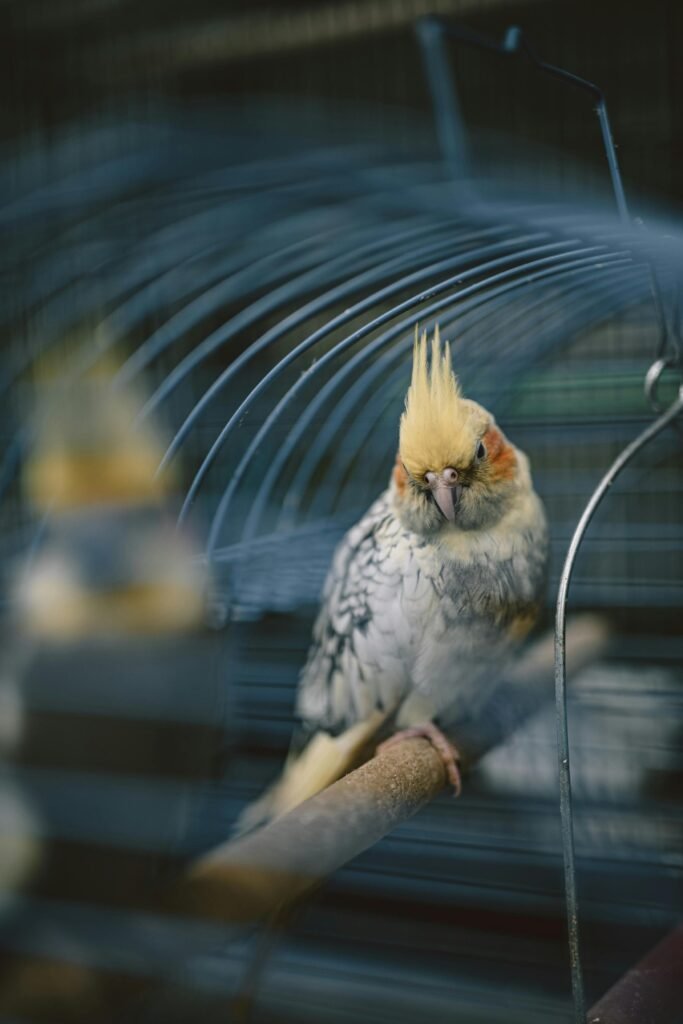
Cockatiels are beloved pet birds known for their vibrant colors, charming personalities, and musical whistles. If you’re considering adding a cockatiel to your family, one important question you may have is: how long does a cockatiel bird live? In this article, we will explore the average lifespan of a cockatiel, factors that influence their lifespan, and tips for ensuring your feathered friend lives a long and healthy life.
Average Lifespan of Cockatiels
On average, cockatiels live 15 to 20 years. However, they can live well into their 20s or beyond with proper care and a healthy lifestyle. It’s essential to note that a cockatiel’s lifespan can vary depending on several factors, including genetics, diet, environment, and overall care.
Cockatiels can live up to 20 years or more if they receive proper care and attention. With advancements in avian care and nutrition, these birds are not uncommon to surpass their expected lifespan. Providing a well-balanced diet, regular exercise, mental stimulation, and routine veterinary care are key factors in promoting your cockatiel’s long and healthy life.
Factors Influencing Cockatiels’ Lifespan
- Genetics: Like humans, genetics play a significant role in determining a cockatiel’s lifespan. Some birds may have a genetic predisposition to certain health conditions, while others may inherit robust genes contributing to their longevity. Understanding your cockatiel’s lineage and potential genetic health risks can help you provide appropriate care and early intervention if needed.
- Diet and Nutrition: A well-balanced diet is crucial for a cockatiel’s health and lifespan. These birds should have a varied diet consisting of high-quality commercial bird pellets, fresh fruits and vegetables, and occasional treats. Cockatiels have specific dietary requirements, so it’s important to offer a variety of foods that meet their nutritional needs. Avoid feeding them harmful foods such as chocolate, avocado, caffeine, alcohol, and high-sodium or sugary snacks, as these can lead to obesity, malnutrition, and other health issues.
- Exercise and Mental Stimulation: Cockatiels are active birds that require regular exercise and mental stimulation to maintain their physical and mental well-being. It is essential to provide them with plenty of toys, perches, and out-of-cage time for flying and exploration. Engaging in interactive play sessions with your cockatiel can also help keep them mentally stimulated. Regular exercise not only promotes physical health but also prevents obesity and encourages natural behaviors.
- Veterinary Care: Regular visits to an avian veterinarian are crucial for ensuring your cockatiel’s health and longevity. Vet check-ups can help detect and prevent any underlying health issues early on. Routine examinations, vaccinations, and parasite control are essential aspects of proper veterinary care for your feathered companion. A qualified avian veterinarian can guide diet, behavior, and any specific cockatiel-related health concerns.
- Environment: Creating a safe and comfortable environment for your cockatiel is vital. Ensure their cage is spacious enough for them to move around comfortably, with appropriate perches, toys, and various stimulating accessories. The cage should be placed away from drafts, direct sunlight, and other potential hazards. Providing a stimulating environment with different perches, toys that encourage foraging, and opportunities for social interaction can enhance your cockatiel’s overall well-being and lifespan.
- Social Interaction: Cockatiels are social birds and thrive on companionship. They require regular interaction and bonding with their human caretakers. If you cannot spend extended periods with your cockatiel, consider adopting a companion bird to prevent loneliness and ensure their overall well-being. Social interaction not only provides mental stimulation but also helps prevent behavioral issues that can arise from boredom or lack of socialization.

Tips for Increasing Cockatiels’ Lifespan
- Proper Cage Setup: Set up a spacious cage with enough room for your cockatiel to spread its wings and fly. Include perches of different sizes and textures to provide foot exercise and prevent foot problems. Provide a variety of toys and accessories to keep your cockatiel entertained and mentally stimulated.
- Healthy Diet: Provide a balanced diet of high-quality bird pellets, fresh vegetables, and fruits. Ensure a constant supply of fresh, clean water. Offering a diverse range of foods that meet your cockatiel’s nutritional requirements is essential. Consider consulting with an avian veterinarian or avian nutritionist to ensure you provide the best diet for your feathered friend.
- Regular Exercise: Allow your cockatiel to spend time outside its cage daily. Provide ample opportunity for flight and physical activity. Engage in interactive play sessions to keep them mentally stimulated. Cockatiels enjoy exploring their surroundings and can benefit from supervised out-of-cage time, which allows them to stretch their wings and exercise their natural behaviors.
- Hygiene and Cleanliness: Maintain a clean cage by regularly cleaning and disinfecting it. Clean their food and water dishes daily to prevent bacterial growth. Regularly trim their nails and beak or seek professional help if needed. Good hygiene practices are essential for preventing infections, maintaining healthy feathers, and promoting overall well-being.
- Avoid Harmful Substances: Protect your cockatiel from toxic substances such as cigarette smoke, household cleaners, and aerosol sprays, as they can harm their respiratory system. Cockatiels have sensitive respiratory systems, and exposure to harmful chemicals or substances can lead to serious health issues. Ensure a clean and well-ventilated environment for your bird.
- Regular Vet Check-ups: Schedule routine visits to an avian veterinarian for health check-ups, vaccinations, and necessary treatments. Early detection of health issues can significantly increase their chances of recovery. A qualified avian veterinarian’s thorough examination can help identify potential health concerns and provide appropriate treatment or preventive measures.
- Emotional Well-being: Cockatiels are highly intelligent and social birds. Spend quality time with your pet, offering love, attention, and mental stimulation. Provide a stimulating environment with interactive toys, and consider getting a companion bird if you cannot be with them for extended periods. Emotional well-being is crucial for the overall health and happiness of your cockatiel.
By following these tips and providing proper care, you can greatly increase the lifespan of your beloved cockatiel bird. Remember, a happy and healthy bird is a long-lived bird!
Disclaimer: The information provided in this article is for general informational purposes only and should not be considered professional veterinary advice. Always consult a qualified avian veterinarian for specific guidance regarding your cockatiel’s health and care.
FAQ
Q: What is the average lifespan of a cockatiel bird?
A: On average, cockatiels live 15 to 20 years, but with proper care, they can live well into their 20s or even beyond.
Q: What factors can influence a cockatiel’s lifespan?
A: Several factors can influence a cockatiel’s lifespan, including genetics, diet and nutrition, exercise and mental stimulation, veterinary care, environment, and social interaction.
Q: How can I increase the lifespan of my cockatiel?
A: To increase your cockatiel’s lifespan, ensure a proper cage setup with enough space, provide a healthy diet, allow for regular exercise and mental stimulation, maintain hygiene and cleanliness, avoid harmful substances, schedule regular vet check-ups, and prioritize their emotional well-being.
Q: Should I consult a veterinarian for my cockatiel’s health and care?
A: It is important to consult with a qualified avian veterinarian for specific guidance regarding your cockatiel’s health and care. They can provide professional advice and detect any potential health issues early on.



